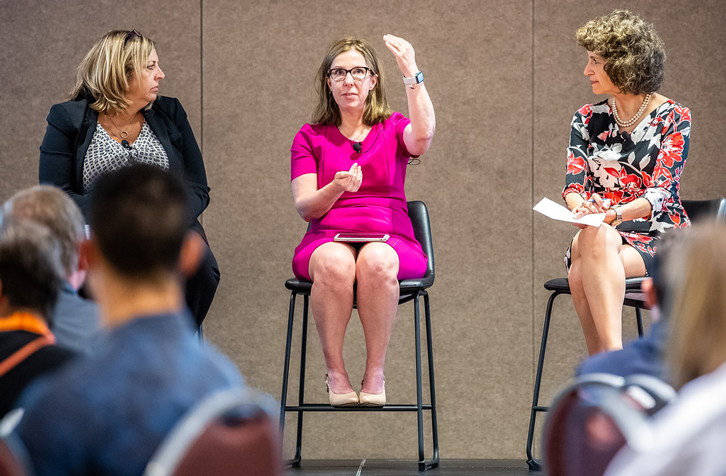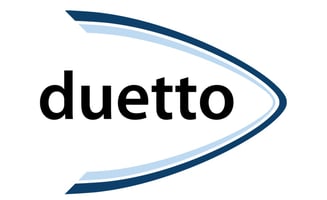by Jason Q. Freed, Managing Editor
In the News
Bridging the Divide Between Revenue, Asset Managers
As the numbers people, revenue managers often have the information owners and asset managers need, and experts say communications between the two sides are vital.
By Sean McCracken, News Editor
image-block-outer-wrapper
layout-caption-below
design-layout-inline
combination-animation-none
individual-animation-none
individual-text-animation-none
"
data-test="image-block-inline-outer-wrapper"
>
sqs-block-image-figure
intrinsic
"
style="max-width:726px;"
>
class="image-block-wrapper"
data-animation-role="image"
>
>

From left: Kim Gauthier, of HotelAVE; Diane Fox, of CHMWarnick; and Cindy Estis Green, of Kalibri Labs; talk during the 2019 HSMAI Revenue Optimization Conference. (Photo: Joe Szurszewski)
MINNEAPOLIS—It’s vital for ownership groups—including the asset managers that represent them—and revenue-management teams to work together toward common goals, according to experts who spoke at the 2019 HSMAI Revenue Optimization Conference.
During the “Revenue professional’s guide to asset value and profitability” panel, Kim Gauthier, SVP of HotelAVE, said revenue managers need to understand what owners want and what success means to them. That includes focusing on the right metrics.
Net operating income is “what asset managers are focused on,” she said. “NOI is what pays debt service. And you need to remember that’s somebody’s pension fund or inheritance. It’s (important to someone), so the decisions you make on a daily basis have a lot more impact on the people above you. It can be mind-boggling when you think about what that looks like to them.”
Diane Fox, SVP at CHMWarnick, said it’s similarly important for asset managers like her to have some empathy for revenue managers.
“What you guys do is very complicated,” she said.
The role of revenue management should grow significantly on-property to the point that there should be a position equal to general managers that reports directly to ownership and oversees the revenue management and strategy, Fox said. That person should also have a laser focus on profitability.
She said communication remains a significant hurdle.
“Today, what we can accomplish is to help break down the silos to improve communications and strategy among digital teams, sales teams and above-property teams,” Fox said. “It’s all very complicated.”
She said revenue managers will benefit from understanding the strategy behind owners’ investments into hotel properties and what they hope to get out of them.
“You should ask yourself, ‘What did the investor want to accomplish?’ … Then ask yourself ‘If (I were the owner) what would I do?’” she said.
Gauthier said in addition to understanding ownership’s initial objectives, revenue managers need to stay in touch with how those objectives evolve over time.
“It could be that right now we need the revenue team to focus on profitability because of a debt-service test and we’re less concerned about (revenue per available room) index,” she said.
She said bridging the gap is especially important when it comes to larger organizations.
Gauthier noted revenue managers are often younger and have a fresh perspective.
“You should think about how you’d think as a customer and bring that to the table, especially with the people who are older than you,” she said. “I think there’s a lot to add there.”
Asked whether revenue managers should ultimately be the person on-property tasked with protecting the value of hotel assets, Gauthier said the approach needs to be more collaborative. She said that often puts revenue managers in a position where they need to have uncomfortable conversations with owners and asset managers, but they will benefit from transparency.
“Without honest communication, you don’t have any self-integrity,” she said. “It’s not fun, and nobody wants to be in that place (where they have to talk about bad news), but you have to step up and voice it. Hopefully you’re in an environment where people are in a position to listen.”
She said being able to handle these difficult conversations is no longer an option.
“You have to man up and say what you want to say, otherwise you can go be a farmer,” Gauthier said. “It’s the way the world is now, and it’s going to continue to be that way. You have to say your piece and be comfortable you did everything you could do.”
She said that stems from the fact that when something is going wrong at a hotel in terms of operations, revenue managers have the best view into why that might be or at least to raise a red flag.
Fox said revenue managers need to have a significant voice in making major decisions such as the property’s way to allocate resources and the right channel mix.
“You’re in a unique position to bring ideas to the table,” she said.
She said revenue managers are often put in roles that are intended to be focused on the day-to-day, but setting big-picture goals will help them better align with ownership’s interests, as long as they understand what those interests are.
“You should always understand what the end goal is of the ownership group or for their investment in the asset,” she said. “Then you try to change the way you’re thinking and go back to ‘What would I do (if I was that owner)?’”
Read the full article on Hospitality Net
Schedule a demo to increase hotel profitability and to enable the revenue team’s collaboration




